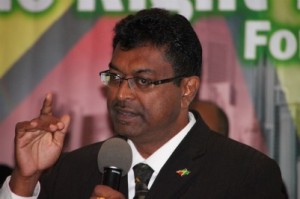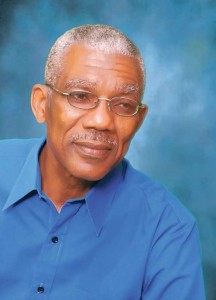
Attorney General and Legal Affairs Minister Anil Nandlall said government is not pleased with the proceedings in the National Assembly, stating that the opposition is abusing the process and, in some instances violating the laws of Guyana. On the issue of parliamentary motions moved by the opposition, the attorney general stated that they are seeking to do a number of irrelevant things, most of which do not require a motion.
Pointing to the fact that some of the motions sought to demand information, he explained that the way is already established for the parliamentary process to serve this end.
Nandlall said that an opposition could simply ask a question of a minister during the sitting of the Assembly, or use the Parliamentary Standing Committees, which are now dominated by the opposition. These committees have the power to compel or subpoena any documents required, and such procedures can allow for all the information required, most of which are available to the public.
Almost all public entities, ministries, etc. have documents in relation to their respective offices in the public domain, while the auditor general annually audits their financial accounts, and his report is presented to the National Assembly.
Abuse of parliamentary process
The parliamentary process is being abused, misused and manipulated to score political points the AG declared, adding that it is “a sham and a veneer” that is created to fool the public that there is an active opposition in the Parliament, and they have the government under pressure.
Reiterating that all information required can be supplied using the existing mechanisms in and out of Parliament, he stated that some of the motions sought to bring contracts to the National Assembly for review.
“The National Assembly has no jurisdiction over contracts. A contract is a binding document between the two parties who are signing them. Of course, there are different sections of the National Assembly through which questions on that type of document can be requested. But for the National Assembly as a body to sit and review contracts is not a power that the National Assembly has,” the AG explained.
Questioning the purpose of reviewing contracts, he added that the National Assembly has no power to annul, rescind, or do anything about the contract which remains a binding agreement between two parties.
With a battery of lawyers on the opposition’s side, “they either understand that, and they are manipulating, abusing and misusing the parliamentary process or they don’t understand it, and that is quite a distinct possibility,” the AG stated.
Motion violates law

A motion put forward by opposition MP Carl Greenidge of the A Partnership for National Unity (APNU) sought to compel the Parliament and the government to deposit all monies which are held in extra budgetary funds into the Consolidated Fund. The motion was passed using the joint opposition one-seat majority.
AG Nandlall stated that the laws of Guyana along with the Constitution, created the Consolidated Fund.
He noted that there are different rules of law, accountancy and accounting principles which apply to the Consolidated Fund and extra budgetary funds.
“The extra budgetary fund clearly was established to be separate and apart from the Consolidated Fund. The Consolidated Fund was established by the Constitution. Article 216 says very clearly that all public monies must be deposited in the Consolidated Fund, save and except if a law says that it must be deposited elsewhere. For example, extra budgetary funds are for statutory agencies like the GGMC. These things are created by statute and the statutes that create them tell us where you must deposit the monies from these bodies.”
The AG pointed to the fact that the National Assembly is the forum through which laws come as bills in Parliament and are debated before receiving presidential concurrence to become law.
“So the National Assembly is very instrumental in the law making process, and if the National Assembly is in itself and by its own conduct violating the laws of the land, how does the National Assembly expect the ordinary man in the street to obey the law when they themselves are violating the law?” he questioned.
Speaker’s responsibility
AG Nandlall said he brought these points emphatically to the attention of the Speaker of the National Assembly Raphael Trotman.
“The Speaker is ultimately presiding over the National Assembly and is ultimately responsible for the way in which the National Assembly conducts itself,” he observed.

A Parliamentary majority does not authorise actions outside of the Constitution, “You are a creature of the Constitution, so you must act within the Constitution. A majority cannot allow you to act outside of the laws of Guyana. The Parliament is not above the Constitution. I believe that the Speaker understands that,” he stated.
“You cannot use a majority to arrogate the laws of the land; to allocate to yourself powers which you do not have as a National Assembly; to perform functions which you do not want as a National Assembly,” he said.
Pointing out that the National Assembly is moving another motion by APNU’s MP Carl Greenidge to set up a committee to review legislation, the AG stated clearly that the power to review legislation “is a power which resides in the court only”. He said the National Assembly is proposing to hear and debate a motion, the purpose of which is to set up a committee within the Assembly, of members to review a valid law which was passed by the National Assembly.
Responsibility of the legislature Nandlall declared that while the National Assembly cannot review its own laws, such a motion has been scheduled to be debated at the next sitting, and will no doubt be passed.
President and executive mandate





Comments are closed.